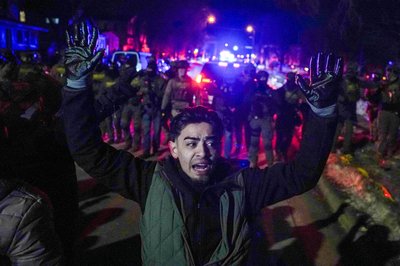Summary
For years, advocates argued that incarcerated people in the U.S. are overcharged for basic phone calls. A new law aimed at capping those costs recently went into effect, but a new report is sounding the alarm about the escalating costs of other essential services like video and electronic messaging. Communities Correspondent Roby Chavez reports for our series, Searching for Justice. Over the last two decades, political pressure from families and advocates has helped lower prices of prison and jail phone rates. While most advocates claim we’re headed in the right direction, they say there are still major gaps in reform. For a transcript of this story, click here . KEY TERMS- Advocate — a person who publicly supports or recommends a particular cause or policy.
- Fee (noun) — a payment made to a professional or institution in exchange for services.
- Fine (noun) — a sum of money charged as a punishment.
Five Facts
- What communication services are still being exploited by prison telecom companies?
- Where are the costs of e-message services 50 cents or lower?
- Which government agency has the authority to regulate in-state prison phone calls?
- Why do jail phone calls tend to be more expensive than ones in state prisons?
- How do communication costs affect families with incarcerated loved ones?
Focus Questions
PBS Newshour’s Roby Chavez reports that Securus alone supplies nearly half of the prisons systems that offer e-massing, holding contracts in 22 states. He also reports that county jails, unlike state prisons, can’t negotiate down rates. What does it mean when the incarceration system relies on businesses to supply basic public goods? News analysis : Roby Chavez reports on Charles Amos, a formerly incarcerated individual who helps his friends in prison communicate with their relatives. “Helping his friends stay connected to their families has eaten into his savings. It’s money that Amos could use to pay for his upcoming wedding and his new life,” says Chavez, adding that last Christmas, “Amos couldn’t buy gifts and delayed buying a winter coat because he wanted to make sure his friends in prison had money to make calls.” Why do you think Chavez is focusing on Amos’ sacrifice?For More
- Research, scrutinize and share the Prison Policy Initiative report, along with your notes from this activity.
-
Read
this article
to learn more about the costs of staying in touch while incarcerated.

- This story is part of NewsHour's " Searching for Justice " Series. Searching for Justice explores criminal justice reforms unfolding across the country, as the leaders from both sides of the political aisle attempt to end mass incarceration by rethinking laws that some say have become barriers to work, housing, and economic stability. Click here for more stories and the series and watch for more NewsHour Classroom lesson content based on Searching for Justice stories.
Fill out this form to share your thoughts on Classroom’s resources. Sign up for NewsHour Classroom’s ready-to-go Daily News Lessons delivered to your inbox each morning.





